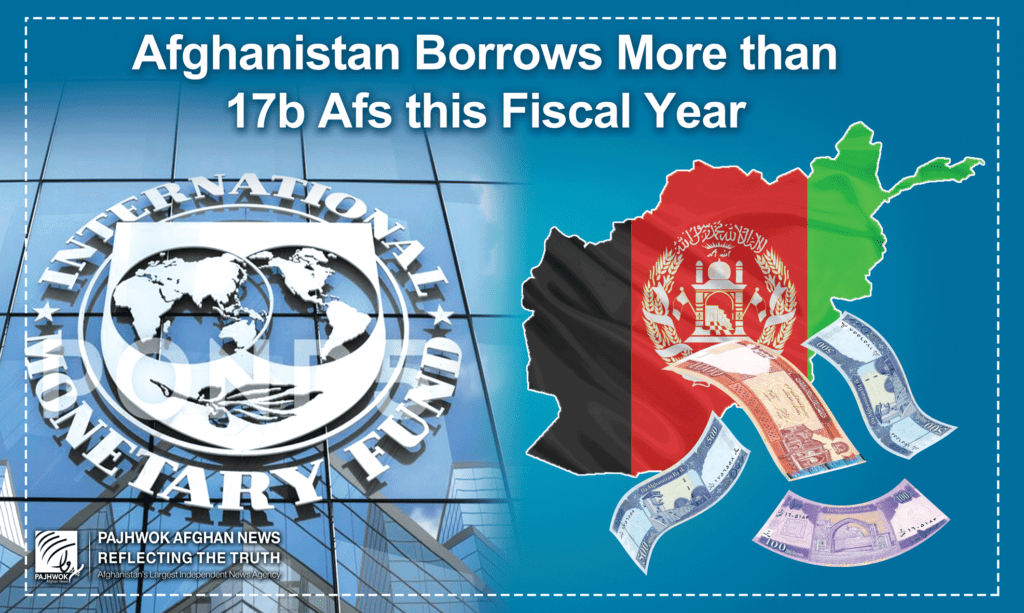KABUL (Pajhwok): The Afghan government has borrowed 17.4 billion afghanis from the International Monetary Fund (IMF) during the ongoing fiscal year.
According to Pajhwok Afghan News report, Afghanistan has received $1.8 billion in loans from World Bank, Islamic Development Bank, Saudi Fund, Asian Development Bank (ADB), IMF, Bulgaria, Italy, Kuwait Fund and OPEC Fund over the past 17 years.
During the period, the country repaid only $300 million.
According to Finance Ministry sources, Afghanistan currently owes the International Community $1.5 billion.
Budget deficit led to fresh borrowing:
Mohammad Rafi Taab, a spokesman for the Ministry of Finance (MoF), acknowledged to Pajhwok that the Afghan government had taken loan this year due to a budget deficit.
He added: “The MoF had projected a budget deficit of 17.4 billion afghanis in 1400 solar year, and the ministry has borrowed it from the International Monetary Fund (IMF).”
Without elaborating, he said the money had been borrowed from international foundations to meet the government expanses.
He did not provide details about the interest on the loan, but said Afghanistan was obliged to repay the loan by June 2026.
The Afghan government has borrowed a total of 1.5 billion dollars from the international countries and foundations and it was easy to repay these loans, because most of them had no interest, he explained.
Economic analysts:
Economists say borrowing from international organizations for implementation of projects is not a concern but there should be transparency in all affairs.
They say budget deficits are worrisome and unnecessary spending should be avoided to prevent the budget deficit in the current and future fiscal years.
SaifuddinSaihoon, who teaches economics at Kabul University, told Pajhwok that borrowing money for projects implementation was not a problem as many countries did so to implement their programs.
He said: “Probably countries that are unable to repay their loans are more likely being forgiven to repay.”
He described the budget deficit as “worrying”, saying that huge concession, the purchase of expensive furniture, color for palaces, the cost of useless projects, travels and unnecessary meetings were the reasons behind the budget deficit.
Saihoon said his government should be able to maintain its financial resources from tax collection, sale of interest-bearing documents, sale of assets and more.
According to him, another way to solve the budget deficit is to borrow from the central bank, even from people, but in case it is not possible to borrow local banks, the government can borrow from the World Bank, the international community and friendly countries.
Stressing proportionality of the government’s treasury and expenditure, Saihoon said the government should manage its financial resource properly and regulate its expenditures based on its revenues, as well as monitor revenue and prevent theft.
At the same time, Qais Mohammadi, a lecturer at a private university in Kabul and a political analyst, said borrowing from reputable countries and foundations was not a problem.
He asked the MoF to set up a comprehensive and systematic mechanism for the government to repay the loans and create programs to repay it on time.
The economist said it was more appropriate to obtain loans domestically than internationally, adding that getting domestic loans would help domestic banks through interest rates.
He said the budget deficit was not a new issue, it happened in the past as well.
“Afghanistan’s development budget is controlled by donor countries and the budget deficit will be addressed through international aid,” he explained.
He criticized the existence of corruption in various areas of revenue collection, saying that corruption, purchase of expensive cars, unprecedented fuel costs and other unnecessary expenses caused the budget deficit.
Mohammadi said the revenue of municipalities, customs and other sources of revenue in the country was being embezzled due to corruption, which must be curbed.
The systematic corruption has taken root in the government; he said, adding there was no other way to solve the problem except serious legal actions.
According to him, in order to reduce the budget deficit, addition expenses need to be reduced and economic activities should be boosted.
Sa/ma








GET IN TOUCH
NEWSLETTER
SUGGEST A STORY
PAJHWOK MOBILE APP